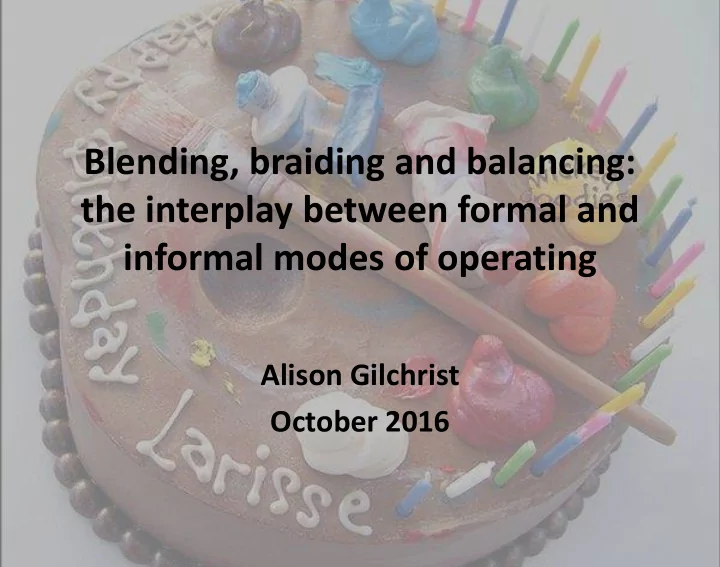

Blending, braiding and balancing: the interplay between formal and informal modes of operating Alison Gilchrist October 2016
Background and motivation • Community development/engagement • Networking research and practice • Importance of informal processes and relationships – insufficiently valued • Frictions and tensions at the interface and points of transition • Explore what was happening at these junctures • Gather evidence to inform better policy-making and practice for people working with communities
Context • Perennial interest in ‘harnessing’ community spirit, energy, resources and expertise • Ideological commitment to ‘small state’, localism, citizen empowerment and community- led social action - cf Bigger and Stronger Society discussion paper (June 2015) • Cuts in public spending, esp. at local levels, so greater expectations for volunteering and community-level service delivery • Reductions in statutory services and professional support for communities
Multi-faceted typology Sites of interplay (sometimes with simultaneous and combined modes of formal and informal operating) Transitions Interface Cross-sectoral between between partnership different communities and co- levels of and large production organisational scale agencies arrangements development
Concepts and ‘fuzzy’ definitions INFORMAL FORMAL Regulations, Unofficial, ‘ off- codes, targets, stage ’, choice, ‘ad impersonal, roles hoc’, fun, inter- and rules, legal personal incorporation, processes, casual, authority, duty, spontaneous, bureaucracy, ‘red intuition, relaxed, tape’, plan, policy, flexible, standards, emotional structure
Methodology • Grounded theory • 27 semi-structured interviews – purposive sampling – snowballing, – range of roles and sectors • 2 workshops and a group discussion with Big Local BL reps • Focus group - sounding board • Literature review
Key themes: power and participation • Living democracy • Organisation development • Power and politics • Risks and standards, including equality and diversity • Shared thinking • Time dimensions
Main findings • Neither a spectrum nor a dichotomy – dialectical approach needed • Benefits and disadvantages – two handed approach – Formal can • Restrict, delay and hinder • Curb emotions and personal biases • Protect and preserve collective goals – Informal can • Be liberating and creative • Include and empower disadvantaged groups • Allow/mask/perpetuate hidden power imbalances • Praxis - complicated set of – judgements, values, skills and strategies – blending, braiding and balancing
Conclusions and implications • Parity and complementarity of formal and informal modes • Quality of relationships matters – t ime and trust, ‘human’ interactions • Optimal, light-touch development • Engagement that co-evolves – respectful and responsive • More flexible, proportionate and ‘grounded’ risk management
Recommendations Policy Practice • Informal as valid and • Favour informal modes – valuable styles and spaces • Trust and respect • Use formality where communities functional • Be aware of • Take an organic approach power/status issues to groups and organisations • Reduce ‘red tape’ • Training in participatory • Gather evidence of ‘true’ styles risks and mitigate them • Fun, food and face-to- appropriately face interactions
Acknowledgements • All contributors to interviews, focus group and workshops • The Trustees of the William Plowden Fellowship • Angus McCabe – Third Sector Research Centre, University of Birmingham
Thank you! Any questions? Download the full report from http://www.birmingham.ac.uk/generic/ts rc/documents/tsrc/working- papers/working-paper-136.pdf
Small group topics • Drawing on your own experience and observations, do the findings and conclusions make sense? • What might these mean for policy and practice? • Which of the recommendations would you want to see implemented?
This event was brought to you by Edge Hill University’s cross-disciplinary research and knowledge exchange initiative. The Institute is committed to exploring the opportunities for cross sector collaboration and co- operation and to draw on the experience of practitioners as well as academic researchers to inform new ways of working and learning . edgehill.ac.uk/i4p @I4PEHU
Check out our upcoming events: edgehill.ac.uk/i4p/events And follow us on twitter: @I4PEHU
Recommend
More recommend